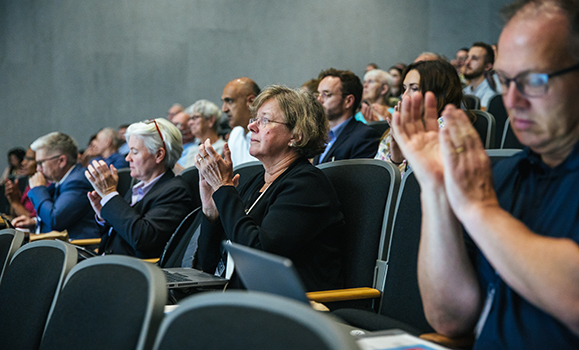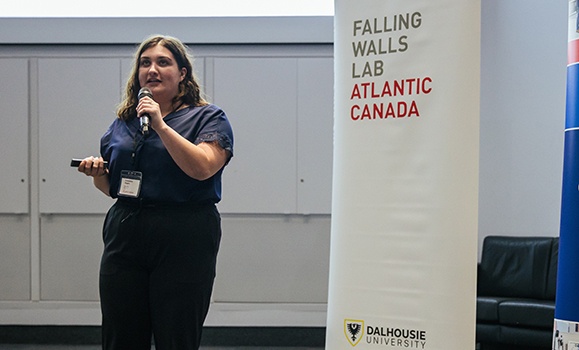Last September, ∫⁄¡œ≥‘πœÕ¯Master‚Äôs student Dina Rogers took first place in the Falling Walls Lab ‚Äì Atlantic Canada pitch competition, winning the chance to represent the region at the global in Berlin.¬Ý
She takes centre stage this Thursday (Nov. 7) along with close to 100 competitors from around the globe presenting their research-based ideas to improve the world to an audience of international thought leaders and Nobel Prize Laureates.
How does she feel about stepping into the spotlight?
“Nobody begins research thinking that their idea will be pitched on an international stage, let alone in front of those who have achieved one of the greatest honors in science like the Nobel Prize,” she says. “If I’m being completely honest, it is daunting. It’s really an honour to be given the opportunity to present your research to a room full of people in general, let alone to some of the most distinguished scientists in the field."
To win the chance to go to Berlin, the master’s in biochemistry student bested 13 contenders armed with evidence-driven ideas to reshape the world — and just three minutes to make their case. She captivated the judges with bioengineered fungal proteins, described as "Pacmen with superpowers," that devour plastic waste.

Attendees applaud a presenter at the Falling Walls-Atlantic Canada pitch competition in September.
Dina says the analogy to the famous ghost-eating videogame hero originated at her family dinner table as she was trying to explain what she was working on in the lab to her parents.¬Ý
“Coming from a big Greek family, having a metaphor that was internationally recognizable was important, so I started using Pacman since it was applicable no matter what language I was speaking,” she says. “Biochemistry is difficult to understand for any scientist, let alone someone who isn’t in the science world. So, making comparative analogies to showcase a principle has been my best friend when explaining any of my research.”
It turns out talking to your parents is good training for life. Early risers can register to stream her pitch live on the on November 7. She between 4 and 6 a.m. Atlantic time.¬Ý
We caught up with Dina before she took off to Berlin.
How did it feel to take the top prize at Falling Walls Lab – Atlantic Canada?
If I had to choose one word, it would be surreal. One thing I have realized in my short time in academia is that scientists don’t often get the limelight to communicate their ideas. Competitions like Falling Walls give us that opportunity. It seems like yesterday I was a senior undergraduate forming a crazy, far-fetched idea for a project with Dr. David Langelaan in his office. Seeing that project progress along and be recognized on a regional level is surreal. But I also think it’s important to recognize that while the process I am developing is unique, this project idea came from the work of other major scientists in the field whose studies gave us the supporting information we need to begin to develop this sort of technology. At the end of the day, science discovery and knowledge is possible because we build collaboratively off others’ work, so for me this win is surreal but also belongs to everyone in the field, not just me.
What did you do to prepare for your winning pitch?
Oh my — honestly, it was blur. I wrote the script while waiting for experiments to run like any grad student. I had a pretty good base since I participated in Dalhousie’s 3 Minute Thesis this past March, but I wanted to make a statement. Most people don’t know what biochemistry is, so I knew I had to catch their attention somehow to be worth remembering. In conjunction with one of my close friends, Jess Latimer, we came up with the idea of dissolving cotton candy at the end of my talk for dramatic effect and representation of the concept. I tried not to over rehearse my pitch since I wanted to be naturally conversational. To calm my nervous energy, I made sure to know which lines to drop if I was running low on time during the actual pitch. Learning the art of improvisation was my best friend because no matter who I practiced to, no two pitches were exactly the same. But I liked that it felt more authentic this way. I was also wholeheartedly unwilling to compromise my lively energy and giggling that I generally approach science with, it was really important to me that while presenting the awe-inspiring science I stayed authentic to myself and my personality.
What are you doing to make sure you’re ready for the global spotlight?
Going to Berlin is equally exhilarating and terrifying. The Dal Innovates team has been phenomenal in offering me support in preparing for Berlin including pitch coaching, trip planning, chats on what to expect, professional slide design and so much more. I’ve been working with coach Permjot Valia who is absolutely brilliant. On a more personal level I’ve been really practicing and editing so that no second in the three minutes is wasted, watching the previous winners’ pitches and just getting really excited – I’ve always enjoyed sharing my passions with others.
There might be Nobel Prize winners in the audience for your pitch. What do you think of being in the esteemed company?
As a young scientist, I’m still learning and growing. Being in the presence of those who have won such a prestigious award is inspiring and intimidating. But I truly believe that the best way to further your professional development and skill set is to aim high and be comfortable being uncomfortable.

